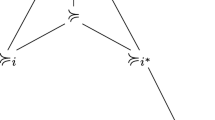Abstract
Previous work by Diffo Lambo and Moulen [Theory and Decision 53, 313–325 (2002)] and Felsenthal and Machover [The Measurement of Voting Power, Edward Elgar Publishing Limited (1998)], shows that all swap preserving measures of voting power are ordinally equivalent on any swap robust simple voting game. Swap preserving measures include the Banzhaf, the Shapley–Shubik and other commonly used measures of a priori voting power. In this paper, we completely characterize the achievable hierarchies for any such measure on a swap robust simple voting game. Each possible hierarchy can be induced by a weighted voting game and we provide a constructive proof of this result. In particular, the strict hierarchy is always achievable as long as there are at least five players.
Similar content being viewed by others
References
Banzhaf J. (1965), Weighted voting doesn’t work: a mathematical analysis. Rugers Law Review 58, 317–343
Diffo Lambo L., Moulen J. (2002), Ordinal equivalence of power notions in voting games. Theory and Decision 53, 313–325
Felsenthal, D.S. and Machover, M. (1998), The Measurement of Voting Power. Edward Elgar Publishing Limited.
Shapley L.S., Shubik M. (1954), A method for evaluating the distribution of power in a committee system. American Political Science Review 48, 787–792
Taylor A.D. (1995), Mathematics and Politics. Textbooks in Mathematical Sciences, Springer-Verlag
Taylor A.D., Zwicker W.S. (1999), Simple Games, Princeton University Press.
Tolle J. (2003), Power distribution in four-player weighted voting systems. Mathematics Magazine 76, 33–39
Tomiyama Y. (1987), Simple game, voting representation and ordinal power equivalence. International Journal on Policy and Information 11, 67–75
Author information
Authors and Affiliations
Corresponding author
Rights and permissions
About this article
Cite this article
Friedman, J., Mcgrath, L. & Parker, C. Achievable Hierarchies In Voting Games. Theor Decis 61, 305–318 (2006). https://doi.org/10.1007/s11238-006-9003-5
Published:
Issue Date:
DOI: https://doi.org/10.1007/s11238-006-9003-5




